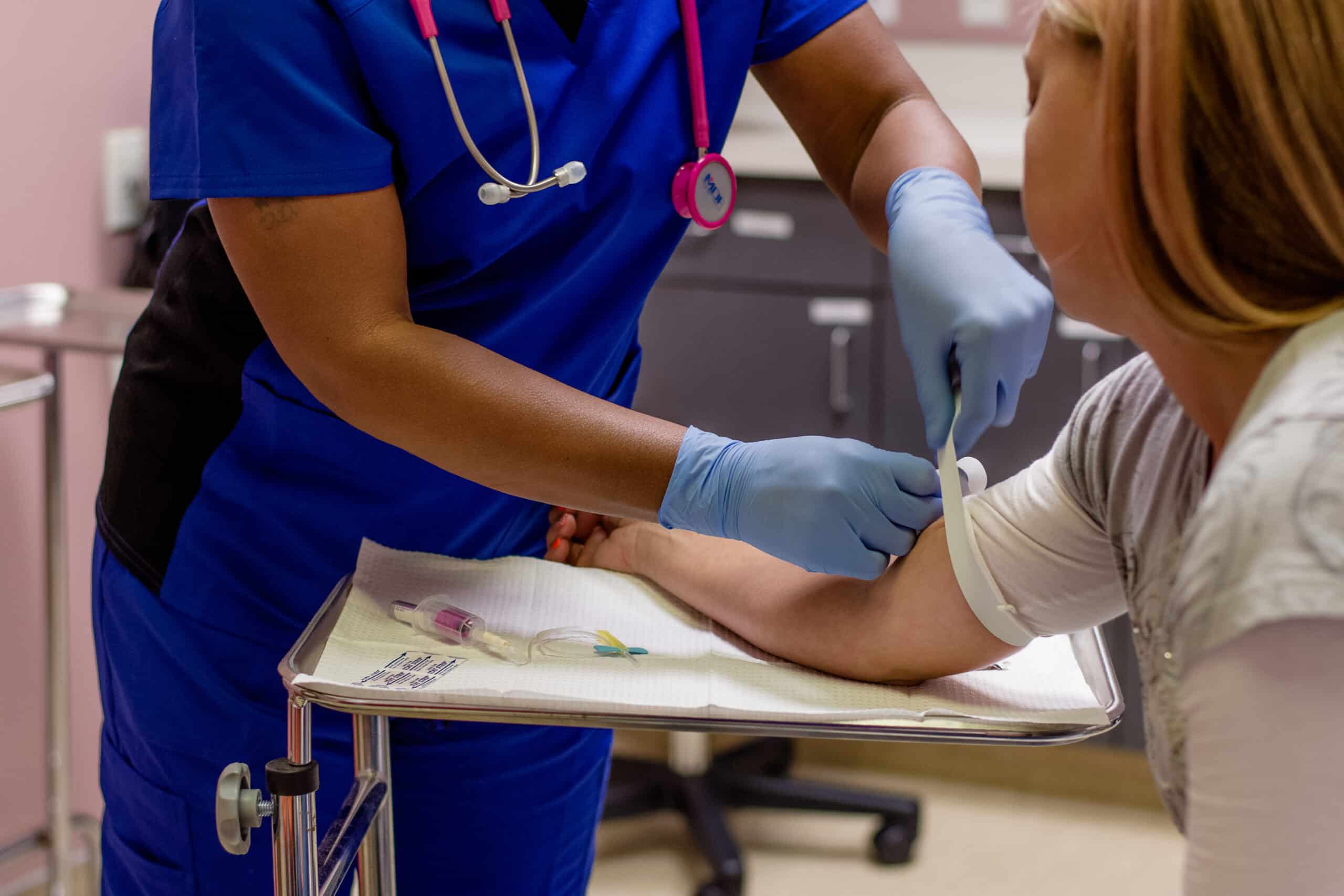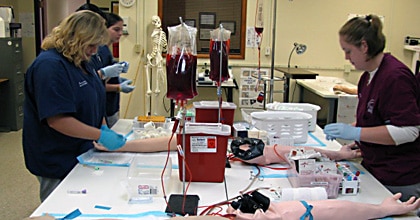Phlebotomy school Success: Tips from Experts
Phlebotomy school Success: Tips from Experts
Blog Article
The Course to Qualification: Recognizing the Phlebotomy Training Program Journey and Its Relevance
As you think about the course to accreditation in phlebotomy, it's vital to understand the duty you'll play in healthcare. Your training will cover essential skills, from blood collection methods to patient communication.

The Function of Phlebotomists in Healthcare
Phlebotomists play a necessary function in the health care system, serving as the essential web link in between people and necessary diagnostic testing. You'll perform blood draws, ensuring samples are gathered properly and safely. Your competence helps in identifying medical conditions, keeping track of health, and directing therapy decisions.
In your daily communications, you'll require to establish trust fund with people, making them feel comfortable throughout what may be a demanding experience. You're liable for labeling and handling samples very carefully to stop contamination or mistakes, which might impact test outcomes.
Beyond this, you'll usually function alongside physicians and registered nurses, communicating vital details about patients' problems. By understanding your abilities, you contribute meaningfully to patient treatment, making you an indispensable part of the clinical group.
Overview of Phlebotomy Training Programs
When checking out phlebotomy training programs, you'll locate different types made to fit various routines and finding out designs. Each program aids you develop necessary abilities like blood collection and patient interaction. Comprehending these options is vital to choosing the best path for your profession.
Kinds Of Training Programs
A number of kinds of training programs are available for those wanting to end up being skillful in phlebotomy. You can select from certification programs, which commonly last a few months and concentrate on necessary skills. There are additionally diploma programs that offer an even more detailed education and learning, often lasting as much as a year. If you're seeking a much deeper understanding, an associate degree in a relevant area may be the ideal fit. On the internet courses offer adaptability for those balancing job or family members commitments, enabling you to study at your own rate. In addition, some hospitals and facilities use on-the-job training programs, providing practical experience while you learn. Whatever course you pick, each program intends to equip you with the necessary skills for a successful phlebotomy profession.

Secret Abilities Created
Grasping phlebotomy calls for a collection of vital skills that are established with comprehensive training programs. In addition, interaction abilities are basic; you'll require to connect with clients, clarify treatments, and placed them at convenience. Each of these skills is crucial for your success as a qualified phlebotomist, making you a valuable property in any kind of medical care setup.
Key Components of a Phlebotomy Training Course
In a phlebotomy program, you'll concentrate on essential subjects that lay the groundwork for your future profession. You'll participate in hands-on training that allows you to use what you've learned in real-world setups. Both the core educational program and functional experience are important for your success as a phlebotomist.
Core Educational Program Introduction
While seeking a phlebotomy training course, you'll encounter a core educational program created to equip you with essential abilities and expertise. Phlebotomy school. This curriculum usually includes anatomy and physiology, focusing on the blood circulation system and understanding blood parts. You'll additionally learn more about different kinds of blood collection techniques, including venipuncture and capillary leak strategies
In addition, infection control and security methods are important components, ensuring you know how to preserve a sterile environment. You'll study patient interaction, emphasizing communication and empathy, which are important for relieving patient anxiety. Moral and legal factors to consider will be dealt with, preparing you for real-world responsibilities. This fundamental knowledge will allow you to stand out as a phlebotomist and provide quality treatment in scientific settings.
Hands-On Training Experience
Getting hands-on experience is an important part of your phlebotomy training course. This useful training permits you to apply what you have actually discovered in a real-world setting, boosting your skills and self-confidence. Phlebotomy Classes Near Me.
Additionally, you'll obtain the possibility to interact with individuals, which is essential for creating your interaction skills. This mix of technological efficiency and interpersonal skills is crucial for your success as a qualified phlebotomist. Inevitably, hands-on training is where concept fulfills technique, strengthening your expertise and preparedness for certification.
Accreditation and Licensing Requirements
Prior to you can begin your career in phlebotomy, it is important to comprehend the certification and licensing needs that differ by state. A lot of states call for phlebotomists to hold a certification from a recognized company, such as the National Phlebotomy Association or the American Society for Scientific Pathology. These accreditations commonly involve passing an exam that checks your understanding and skills in the field.
Along with certification, some states have certain licensing needs. You may need to complete a certain number of hours in professional technique, send evidence of training, or go through a history check. It is necessary to investigate your state's guidelines to ensure you fulfill all required standards.
Remaining educated about these needs not only aids you secure a placement yet additionally enhances your reputation as a specialist. By meeting these requirements, you'll be well on your method to a successful occupation in phlebotomy.
Hands-On Training and Practical Experience
Hands-on training and practical experience are essential components of your phlebotomy education and learning, as they allow you to use academic understanding in real-world scenarios. Throughout your training, you'll participate in monitored venipuncture, discover proper methods, and become acquainted with different blood collection devices. This direct involvement is essential for constructing your confidence and refining your abilities.
You'll function closely with experienced experts who can assist you via the subtleties of patient interaction and sample handling. Each method session not just reinforces your understanding but additionally prepares you for the busy environment of medical care setups.
Additionally, many programs incorporate medical turnings, permitting you to experience diverse settings, from hospitals to outpatient centers. This direct exposure assists you adapt to various difficulties and individual demands, guaranteeing you're well-prepared for your future role. Accept these chances, as they're important to coming to be a qualified and thoughtful phlebotomist.
Obstacles Faced Throughout Training
While obtaining hands-on experience is important, it's essential to identify the challenges that can occur during your phlebotomy training. Additionally, mastering the skills required for blood attracts takes practice; you may battle try these out with technique initially.
Time administration can additionally be a hurdle, as balancing theory, practical sessions, and individual commitments can really feel intimidating. You might face varying finding out speeds among your peers, resulting Click Here in feelings of insecurity if you believe you're falling behind. Adapting to the different individualities of trainers can be difficult, as each might have an unique teaching style.
Identifying these barriers beforehand can prepare you for success and aid you establish durability throughout your training journey.
Job Opportunities After Qualification

As you acquire experience, you might also think about concentrating on locations like pediatric or geriatric phlebotomy, dealing with specific individual needs. Some phlebotomists select to advance their professions by coming to be laboratory service technicians or seeking further education and learning in health care fields.
Furthermore, your accreditation can cause duties in training or managing brand-new phlebotomists, allowing you to share your expertise. With the healthcare market constantly expanding, your skills will certainly always remain in demand, leading the way for a steady and satisfying job. Accept the chances waiting for you!
Regularly Asked Questions
What Is the Typical Duration of a Phlebotomy Training Program?
Phlebotomy training courses normally last around 4 to eight weeks. You'll take part in hands-on practice, classroom direction, look at here and online understanding. Completing this training prepares you for certification and a fulfilling occupation in health care.
Are Online Phlebotomy Courses Available?
Yes, on-line phlebotomy programs are readily available. They use adaptability and convenience, permitting you to research at your own pace. Simply confirm the program is recognized to satisfy qualification needs and gain important skills for your job.
Exactly How Much Does Phlebotomy Training Normally Expense?
Phlebotomy training normally costs in between $700 and $2,500, relying on the program and location. You should think about variables like course length, included materials, and hands-on experience when picking the best training for you.
What Are Typical Prerequisites for Phlebotomy Training?
Usual requirements for phlebotomy training frequently include a senior high school diploma or GED, booster shots, and a history check. Some programs may also require standard medical care expertise or accreditations, guaranteeing you're gotten ready for hands-on training.
Can I Function While Finishing My Phlebotomy Training?
Yes, you can function while finishing your phlebotomy training. Lots of trainees equilibrium work with their researches, yet make sure to manage your time effectively to ensure you fulfill both work and training commitments effectively.
Report this page